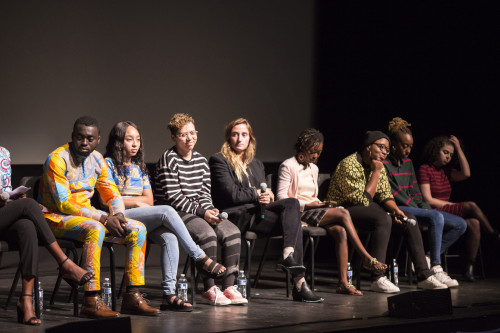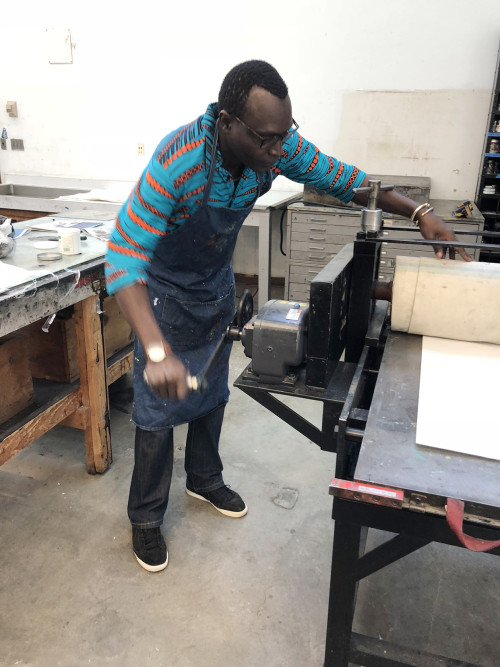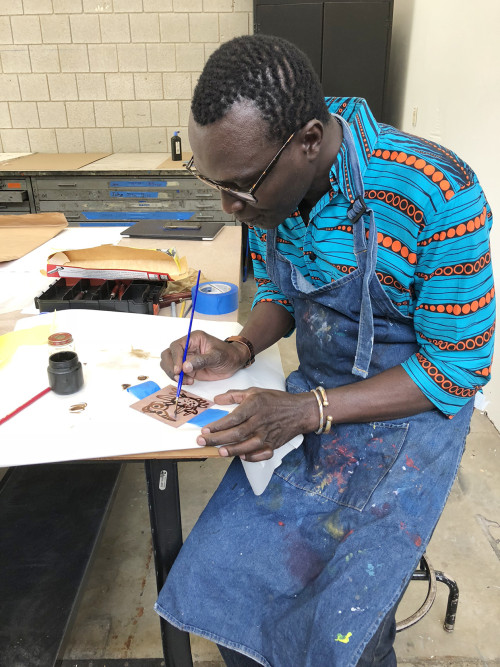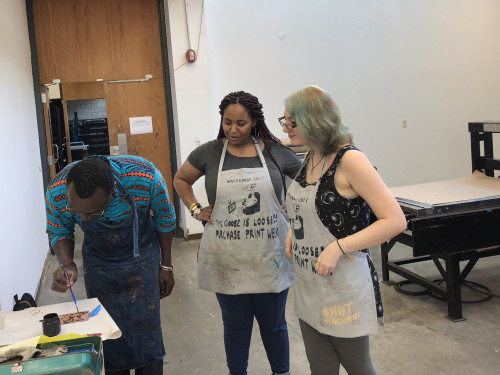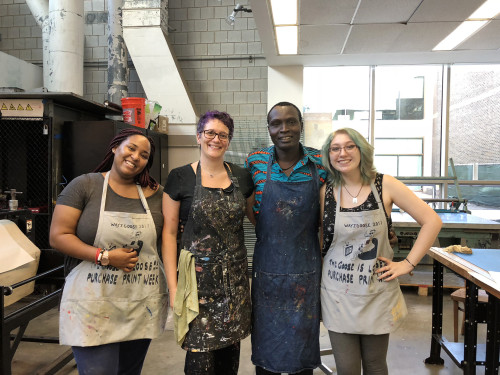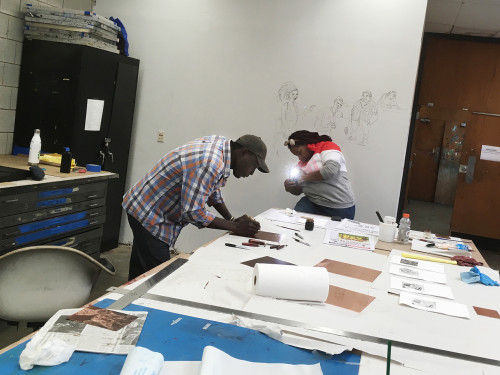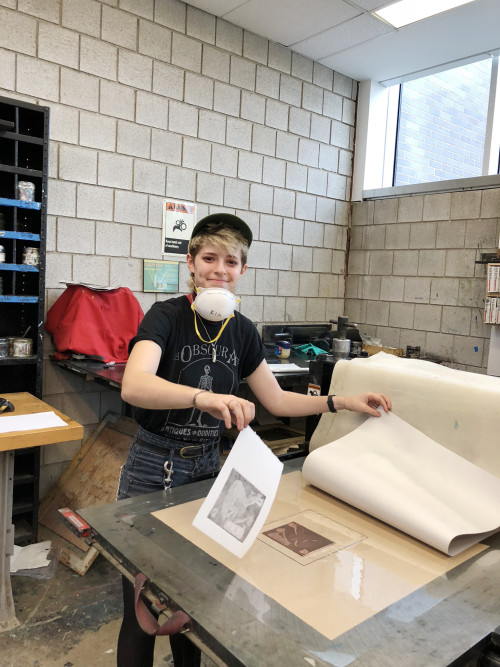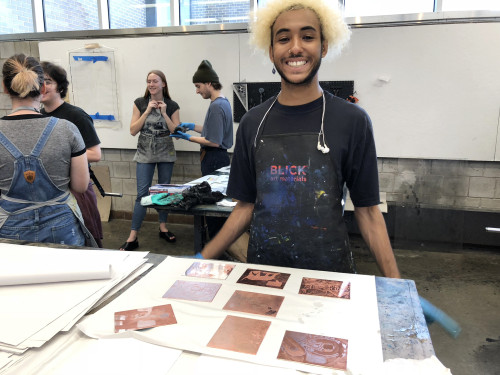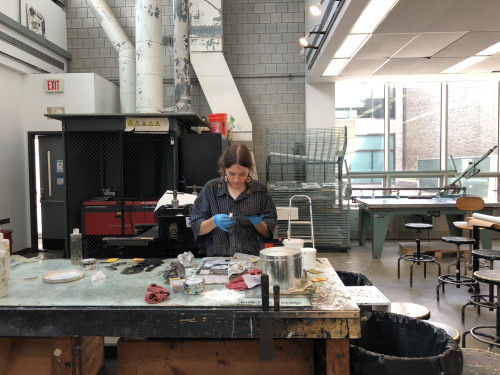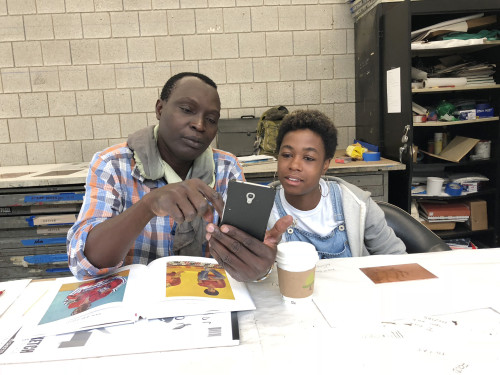What the World Needs Now: Engaged and Aware Citizens
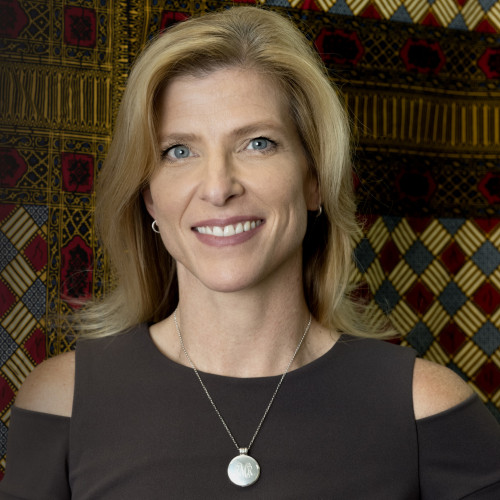
On the second day in her new role as Dean for Global Strategy and International Programs, Anne Kern was preparing to leave for Washington, D.C. with Provost Barry Pearson to meet with Hector Posset, the Benin Ambassador to the U.S. “He’s heard about what Purchase is doing in Benin and wants to know more,” she says.
Purchase is going global. Employing a model that encourages study abroad and service travel programs coupled with programming and curricular ties that bring the world to campus, Purchase hopes to encourage students to see themselves as global actors on the world stage.
Serendipitous Path to Benin
So just how did Purchase become involved with the West African costal country of Benin? “La vie est faite de belles rencontres,” Kern explains in French, then translates, “Life is made of beautiful encounters.”
It was the first year of the Transnational Film Program (TFP) in 2017 and Purchase film students were working with peers from France and Africa on collaborative film projects. However, a warning from the State Department thwarted the original plan: the security risk level was too high for our students to travel to Ethiopia and Burkina Faso.
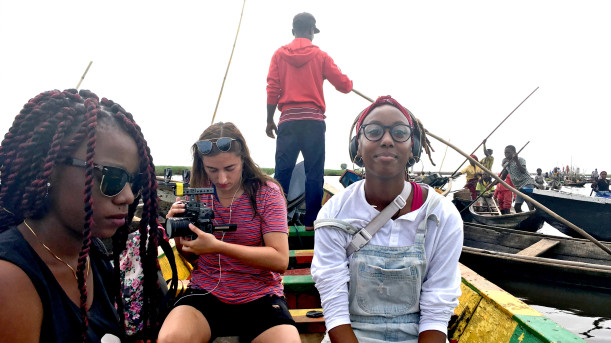
So Kern, also associate professor of cinema studies and head of the TFP, instead accompanied the students to Benin, home to one of our partner film schools, ISMA (Institut Supérieur des Métiers de l’Audiovisuel). As soon as she hit the ground there, Kern grew fascinated with the country—one of the region’s most stable democracies.
Great partnerships soon emerged through mutual friends and Kern began to conceptualize much more than a film collaboration. Working with Marie- Cécile Zinsou, a French-Beninese art museum director, entrepreneur, and president of the Zinsou Foundation, Purchase helped establish a guest residence called the Villa Monteiro in the city of Cotonou as a home base for students, faculty, and visiting artists and scholars.
TFP students as well as those in study abroad programs will stay in the residence. Nestled between two mosques and located in a quartier populaire, or working class neighborhood, it has open spaces for collaboration, a library, and a large dining room for communal meals.
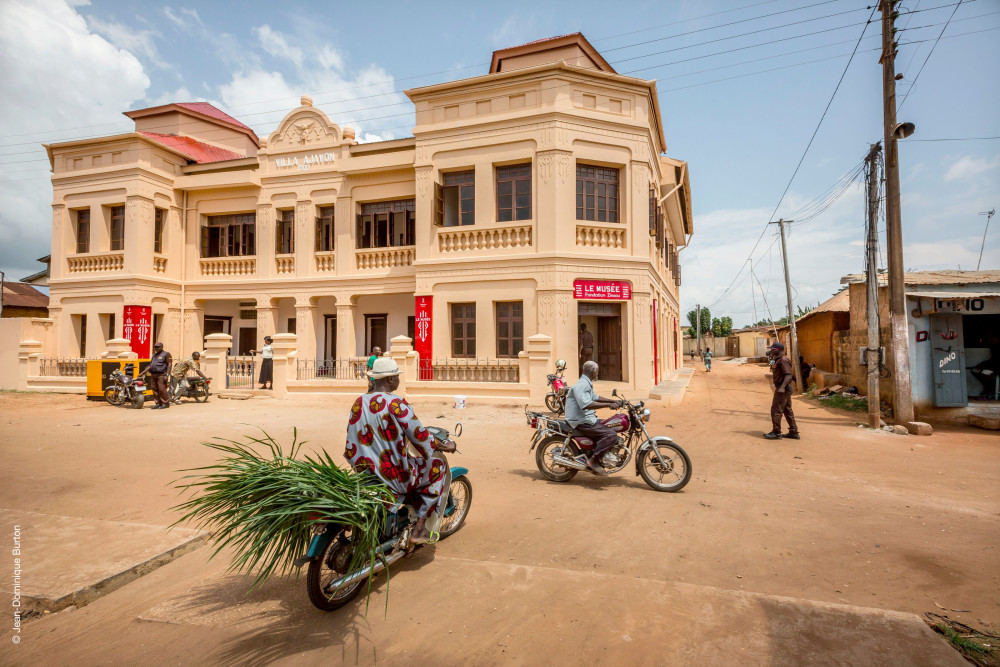
Study abroad programs begin there this January. Provost Pearson will teach a winter course exploring Benin’s culture through the arts, and Lenora Champagne, professor of theatre and performance, will teach a devised theatre course in partnership with the Atelier Nomade, a local theatre school. And in the spring, Professor of Art+Design Cassandra Hooper will introduce a two-week travel component to Benin as part of a course taught on campus.
We Bring the World to Purchase
Providing students who don’t travel abroad the opportunity to engage with global culture and ideas right here on campus is a key initiative of Kern’s new role. She and her team in the Office of International Programs planned the first annual (T)HERE: A Global Festival of Art, Culture & Ideas, which focused entirely on Benin and featured three days of film screenings, performances, lectures, artist-in-residence studio tours, and even a pop-up boutique.
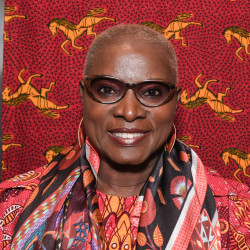
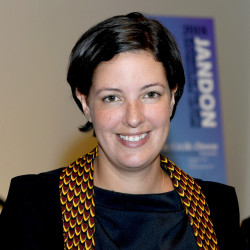
Some of the highlights included the Jandon Business of the Arts Distinguished Lecture with Marie- Cécile Zinsou (above right); a performance by three-time Grammy Award-winning singer, activist, and humanitarian Angélique Kidjo (above left); and the U.S. premiere of the Benin International Musical ensemble. Students interacted with artist Hector Sonon, who was in residence in the School of Art+Design, and a screening featured the films created by students in the Transnational Film Program.
A distinctive feature of the festival was interaction between the staff and students of ISMA with their counterparts at Purchase. A delegation of nine spent 10 days in a series of meetings and classes to learn about many aspects of college administration, from the registrar’s office and finance to career development and the film store. We opened the doors of Purchase to our Beninese guests who’ve reported the experience will be transformational for the development of their institution.
Beyond Globe and Maps
Another essential aspect of the new Purchase model involves integrating more global content into the classroom. Kern will help facilitate curricular ties. “One of my charges is to closely align with the faculty and help find ways to support them in increasing the global content in their academic areas, whether it’s math, or new media, or art history.”
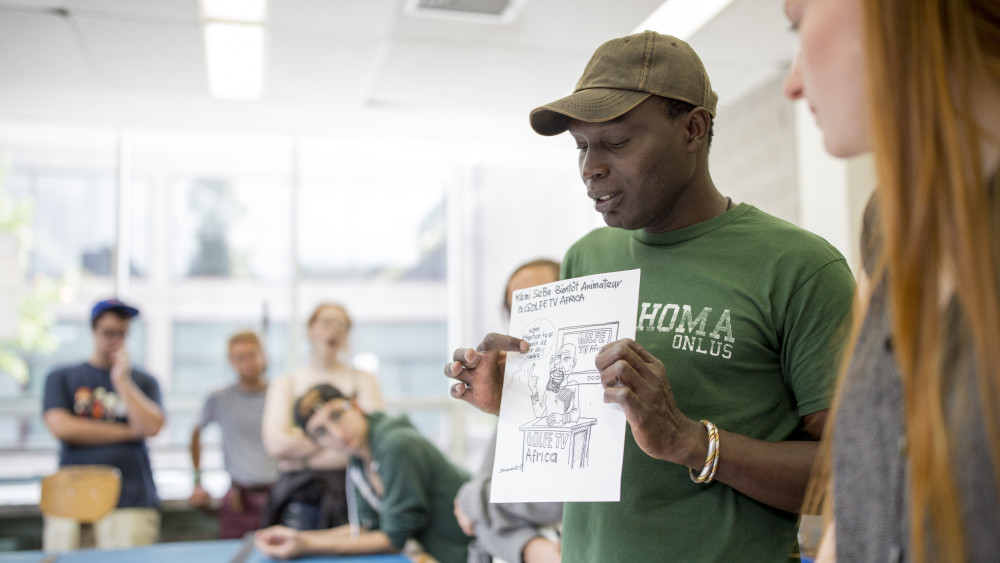
Next Stop: Haiti
Next year’s (T)HERE festival will focus on Haiti. The country’s only film school, the Artists Institute, is the third partner in the Transnational Film Program. Purchase will also participate in SUNY’s major initiative to create a sustainable village and learning community (SVLC) devoted to arts, media, and heritage in Haiti’s Arcahaie, an hour north of Port-Au-Prince. Purchase students and faculty will help local community members tell, preserve, and share their stories and history.
The ongoing partnerships with Haiti and Benin bring structural coherence to Purchase’s global initiatives. “Benin, the U.S., and Haiti have really important historical and cultural connections,” says Kern, “which unfortunately are rooted in the migration pattern along the Transatlantic slave route.
”While these connections stem from a traumatic history, Kern recognizes the ongoing educational potential. “If you trace the history of drumming or jazz, for example, you could trace it along this geographical route. There’s also incredibly rich potential for global black studies, history, literature…and the list goes on.”
The Urgency for Globalization
Now more than ever, students must have broad exposure to ideas, customs, and cultures from all over the world—required knowledge for success in the 21st century workforce. “It’s our responsibility as an institution to help our students realize they have a place in the world, and that’s what we’re trying to do,” says Kern, who hears repeatedly how audacious this model of programming is for a public college.
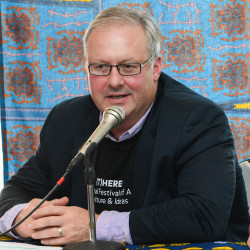
“I know that President Schwarz, the Provost, and everyone in leadership at Purchase share the conviction that it’s exactly our students who should be global actors, because we know that our students are so socially engaged; they’re open, thoughtful, and unabashedly vocal,” Kern explains. “They bring an urgently-needed perspective to global challenges and possibilities.”
It’s evident from student feedback that the plan is on the mark. For many in the Transnational Film Program, for example, the experiences have been transformative. Participant Jessica Gordon ’20 says, “It forced me to alter the filmmaking part of my brain, re-considering how I learned certain techniques and theories. Through its immersive nature, the program caused me to think more globally as a filmmaker.”
Kern is certain that going global is right for Purchase. “I’ve had multiple students tell me that more than making them a better filmmaker, they felt like it made them a better human being.” We couldn’t ask for a better outcome than that.
—Kristi McKee
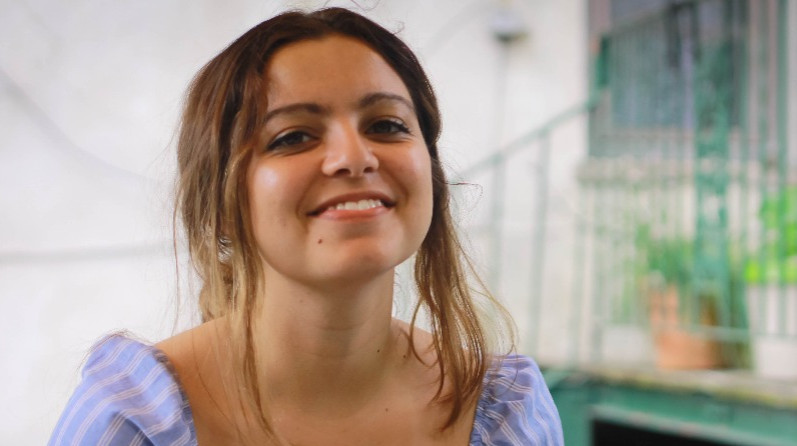
IN HER OWN WORDS:
Film Student Jessica Gordon ’20
“Getting to know someone who is from another culture is a wonderfully complicated experience. The Transnational Film Program offered me the best possible entryway to understanding; it introduced me to some of the greatest filmmakers I’ve ever worked with and some of the kindest friends I’ll ever have. The Transnational Program allows for cultural exchange through an artistic lens. Rather than one culture learning about another, each individual had the space to input and share their experiences and juxtapose them freely against others. This process was enhanced by our task at hand: to create a film. Immediately, we understood that we had to work as a team both emotionally and creatively. There could be no barriers—not between languages, nor cultures, nor artistic differences.
“I can now begin to understand the methods behind certain styles and the deeper sentiments behind stories that are told by international filmmakers. This experience caused me to consider the variety of people whom our films might reach, since our greatest challenge was to create a final product that resonates with a multitude of people. It forced me to think more globally as a person as well. Now, I challenge myself rigorously to make films with that same consideration and openness to understanding—for both my potential audiences and my fellow filmmakers.”
